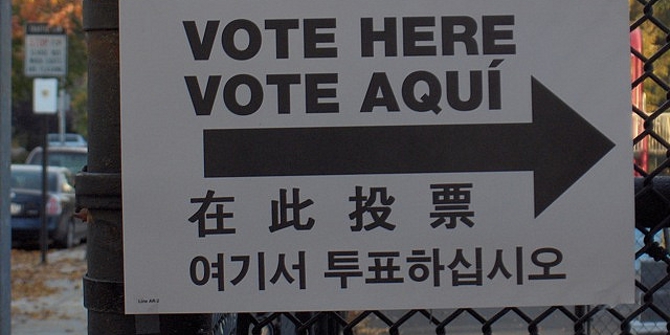
 In the coming weeks former president Donald Trump is likely to announce who will be joining him on the ticket for his 2024 election campaign. But how much influence does a candidate’s pick for vice-president have on a presidential election? Christopher J. Devine and Kyle C. Kopko write that no matter who Donald Trump chooses as his running mate it is unlikely that they will win over a significant number of new voters or voting groups. Instead, they argue, as a key-player in a potential administration, a vice-presidential pick signals to voters about how a presidential candidate is likely to govern once elected.
In the coming weeks former president Donald Trump is likely to announce who will be joining him on the ticket for his 2024 election campaign. But how much influence does a candidate’s pick for vice-president have on a presidential election? Christopher J. Devine and Kyle C. Kopko write that no matter who Donald Trump chooses as his running mate it is unlikely that they will win over a significant number of new voters or voting groups. Instead, they argue, as a key-player in a potential administration, a vice-presidential pick signals to voters about how a presidential candidate is likely to govern once elected.
In a few short weeks, the Republican National Convention will convene in Milwaukee, Wisconsin, to officially nominate Donald Trump as the Republican nominee for president. While Trump’s elevation is a virtual certainty, it remains unclear who his vice-presidential running mate will be. The “veepstakes” – as it is known – is one of the United States’ great political pastimes. Every four years, pundits and political observers speculate about who the “best” pick is for the presidential ticket. And things are no different in 2024. Already, there have been numerous articles and news segments devoted to figuring out who Trump will select as his running mate, and why. Will it be Ohio Senator J.D. Vance? Florida Senator Marco Rubio? South Carolina Senator Tim Scott? New York House Representative Elise Stefanik? North Dakota Governor Doug Burgum? Or someone else?
As we have demonstrated in our two books on this topic – The VP Advantage (2016) and Do Running Mates Matter? (2020) – electoral considerations are frequently cited as a reason to select (or not select) a given running mate. And that makes sense given the relative lack of formal responsibilities of the vice president. By constitutional design, the vice president presides over the US Senate, counts electoral votes in a joint session of Congress, and assumes the presidency upon the president’s death, resignation, removal, or incapacitation. While vice presidents have grown in their informal responsibilities in recent decades, as documented by legal scholar Joel Goldstein and political scientist Jody Baumgartner, the lack of formal duties seemed to relegate vice-presidential candidates to a primarily electoral function throughout much of US history.
Do vice-presidential picks matter in presidential elections?
As Donald Trump picks a running mate, then, one must ask: do vice-presidential candidates influence presidential elections? Our answer: Yes, but not in the way you might think.
In Do Running Mates Matter?, we use a three-part framework to evaluate how running mates influence voters. These include what we call direct effects, targeted effects, and indirect effects. Direct effects are just that – how a vice-presidential candidate directly influences voters, overall. Targeted effects refer to amping up support among a specific sub-set of voters—e.g., appealing to home state voters, women, African Americans, Catholics, Evangelicals, and others. Indirect effects are achieved by influencing voters’ perceptions of the presidential candidate via the VP selection. That is, does the choice of a running mate make the presidential candidate look better in some way–perhaps more likable or trustworthy, younger or older, as being a good leader or having sound judgment? And does this, in turn, win over voters?
After estimating hundreds of statistical models using voter databases dating back to the 1950s, we find that opinions of the vice-presidential candidate usually do have direct effects on vote choice, but not nearly as much as their presidential counterparts. In terms of direct effects, the data suggest that a voter’s evaluation of a presidential candidate matters about three times more in influencing vote choice than their evaluation of a running mate. So, for a vice-presidential candidate to substantially affect an election, he or she must be much more popular or unpopular relative to the presidential candidate. Generally speaking, that doesn’t happen often—although there are some exceptions (e.g., Governor Sarah Palin with Senator John McCain in 2008 as a relatively unpopular candidate, and Senator John Edwards with then Senator John Kerry in 2004 as a relatively popular candidate).

“Vice Presidential podium” by Gage Skidmore is licensed under CC BY SA 2.0
On targeted effects, we find scant evidence that running mates were successful at winning over a particular group of affiliated voters. Running mates rarely “deliver” their home states (in fact, we find no evidence that Lyndon Johnson delivered Texas for John F. Kennedy in 1960). And there is little evidence that a woman running mate mobilizes women voters. For example, we find no statistically significant evidence of this phenomenon in the 1984 or 2008 elections, when Geraldine Ferraro and Sarah Palin, respectively, ran for vice president. In a forthcoming analysis, we do find some evidence that Black and women voters were more likely to vote for the Democratic ticket in 2020, but both groups were already quite likely to vote for Joe Biden. As such, it is unlikely that Kamala Harris attracted a substantial number of new voters in 2020.
What a vice-presidential pick says about the presidential candidate
The evidence shows that vice-presidential candidates most clearly influence voters via indirect effects. The selection of a running mate provides voters with information about the presidential candidate—what they value in selecting a key advisor and potential successor, and how that presidential candidate may govern once elected. The data suggest that voters favor vice-presidential candidates who could competently serve in this important role. If there are doubts about the adequacy of the candidate, then that reflects poorly on the presidential candidate and the ticket overall. For example, our statistical models suggest that after John McCain selected Sarah Palin as his running mate in 2008 and she committed a series of high-profile gaffes, voters became more likely to view McCain as too old to be president and questioned his judgment. Conversely, after Barack Obama selected Joe Biden, the data indicate that voters viewed Obama as increasingly likable, decisive, and experienced.
So, what does this research tell us about Donald Trump’s selection of a running mate? In all likelihood, Trump’s running mate will not have an overwhelming or decisive effect on voters. Why? For at least two reasons. First, as our analysis bears out, voters are primarily voting to elect a president, not a vice president. Second, voters already know quite a lot about Donald Trump. At this stage, there is probably little that a running mate could do to alter a voter’s impression of the former president. Given that his running mate is unlikely to deliver a substantive electoral benefit, Donald Trump, and the country, would be best served by choosing a running mate who is clearly capable of serving effectively as vice president–or president, if necessary. That is why the selection of a running mate really matters. They are not merely electoral partners. Rather, at least in the modern era of US politics, they are key players in any presidential administration. Donald Trump’s choice of a running mate may come during an election campaign, but it is, first and foremost, a choice about governance. If he wants to send Americans the right signal about what a second term in office might look like, he will choose someone with the experience necessary to do the job well.
- Please read our comments policy before commenting.
- Note: This article gives the views of the author, and not the position of USAPP – American Politics and Policy, nor the London School of Economics.
- Shortened URL for this post: https://wp.me/p3I2YF-e49






